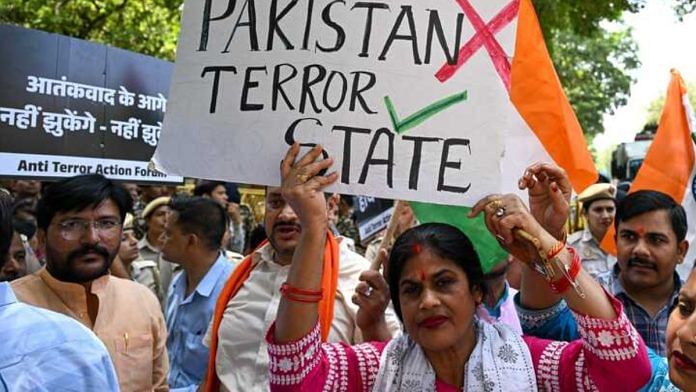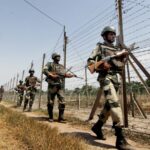In times of national crisis, politics must take a backseat. Encouragingly, Indian political parties seem to be on the same page. Rahul Gandhi’s phone call to home minister Amit Shah and other gestures of support from Opposition leaders mark a shift from the 2019 Pulwama aftermath. An was convened on 24 April, notably the same day Pakistan scheduled its National Security Meeting.
With major powers sending strong messages, the international community has taken note. The key lies in how effectively India can galvanise global support. World leaders—including American President Donald Trump, Russian President Vladimir Putin, Italian Prime Minister Giorgia Meloni, French President Emmanuel Macron, and Israeli Prime Minister Benjamin Netanyahu—have already expressed solidarity with India. President Xi Jinping, however, has remained silent, even as the Chinese ambassador to India issued condolences.
China and Russia are key players in the region whose support is essential. While New Delhi did not explicitly side with Moscow on the Russia-Ukraine war, its strategic neutrality was seen as a gesture of preserving long-standing ties. Therefore, President Vladimir Putin would likely support India, at least diplomatically. Beijing should also be engaged to prevent any adverse reaction, though expecting it to act firmly against Pakistan is unrealistic. China may support Pakistan quietly, as the China-Pakistan Economic Corridor (CPEC) has come under attack from Baloch insurgents, with Pakistan blaming India for . However, international support from other major powers could neutralise China’s intent to help Pakistan overtly.
Michael Rubin, a former Pentagon official and senior fellow at the American Enterprise Institute, has drawn a parallel between , General Asim Munir. He has called on the United States to designate Pakistan as a terrorist state and has even suggested that India should carry out Israel-like action against Pakistan.
The Indian government must carefully weigh its options, considering the fragile global environment. The Russia-Ukraine War and the Hamas-Israel conflict have shown that full-scale wars are prolonged, exhausting, and come at great cost.
The growing Bangladesh-Pakistan-China axis must also be considered. Pakistan has been strengthening military ties with Bangladesh and has made inroads into its army cantonments for training—something that has not been seen since the 1971 Liberation War. Bangladesh Chief Adviser Mohammad Yunus’s recent visit to China, along with discussions on Bay of Bengal access, signals regional realignments. Meanwhile, the United States appears distracted by trade disputes and domestic issues—from to deporting foreign students.
India must avoid being dragged into a two-front war—both east and west. Such a conflict would serve the interests of its enemies and derail its development goals, especially the mission of achieving a Viksit Bharat by 2047. An Israel-style military operation that could impact innocent civilians is against India’s civilisational values.
The option of “water wars” can be considered, but it requires a long-term strategy. Diverting water and developing storage for the Indus and other rivers would require significant investment and time. The suspension of the Indus Water Treaty would be symbolic unless followed by concrete action. It is worth noting that Pakistan is already under severe water stress, especially during the summer.
Visa cancellations, consular staff reductions, and border closures won’t significantly impact Pakistan, but suspending water cooperation could have long-term consequences. This might force the Pakistani establishment onto the defensive.
Disregarding an international treaty could also hurt India’s global credibility and trigger concerns among its neighbours. Considering that Beijing and Islamabad have an “all-weather” friendship, China could deploy a similar tactic against India. Any unilateral action on the Indus Water Treaty must appear justified to avoid international backlash.
As the ancient Chinese military strategist Sun Tzu said, “The best way to win a war is to never start one.” India can respond decisively without triggering full-scale conflict. A surgical strike remains a viable option. However, unlike in 2019, the Pakistani military may now be better prepared. Asim Munir the two-nation theory and the Kashmir issue—indicating a coordinated narrative.
Targeted strikes against jihadi hubs such as the United Jihad Council (Muzaffarabad) and other military assets are possible. Muzaffarabad, the capital of Pakistan-Occupied Kashmir (PoK), is a strategic hub of the Inter-Services Intelligence (ISI). It hosts Joint Intelligence North (JIN), which handles intelligence operations in Jammu and Kashmir and coordinates terrorist activities. Another viable target could be the Lashkar-e-Taiba (LeT) headquarters in Muridke (near Lahore), led by Hafiz Muhammad Saeed.
Pakistan’s military is already stretched thin—engaged on the Afghan border and fighting the Balochistan Liberation Army. Severe fuel and resource shortages have even led to the suspension of exercises as recently as 2023.
However, before launching any such operation, India must assess the risks posed by China and Bangladesh. China is unlikely to intervene militarily due to its economic focus, but localised unrest along the India-Bangladesh border, especially in areas like Murshidabad and Malda involving illegal migrants, could ignite further tensions.
India faces a tough decision. The path forward must be carefully chosen, but it must also be resolute. Simply eliminating small-time jihadists would be too small a price for Pakistan to pay.
Nailing down the ISI and LeT should now be the main objective. Isolating Pakistan diplomatically, getting ISI designated as a terrorist organisation, and executing a well-planned, larger-than-Balakot strike on strategic locations is the need of the hour.
A decisive and strong message must be sent—with absolute clarity and determination.
(Edited by Zoya Bhatti)








